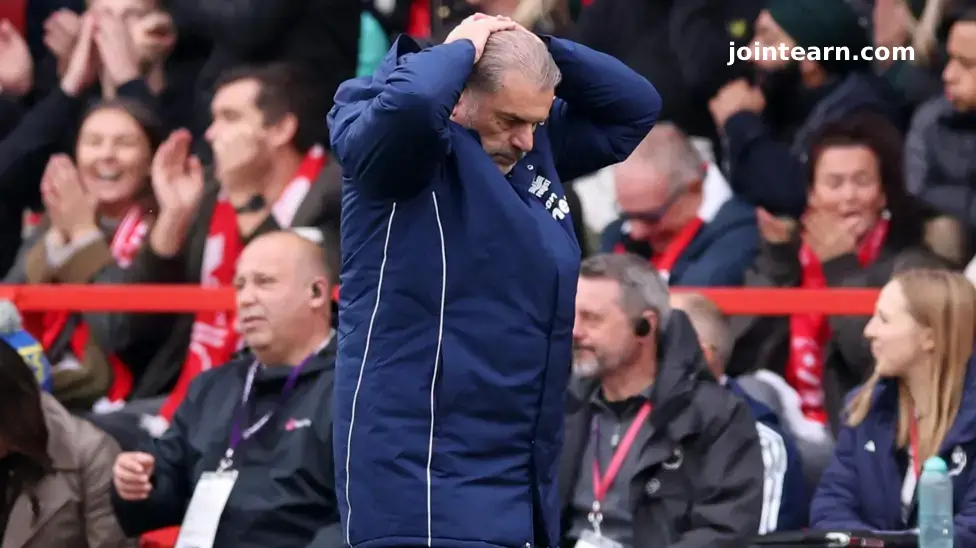
When Ange Postecoglou signed a two-year contract with Nottingham Forest, he expected a long-term project — one that would bring attacking football, European nights, and a fresh identity to the City Ground.
Instead, just 39 days later, the Australian manager became the shortest-serving permanent Premier League boss in history. He barely had time to unpack his belongings before Forest owner Evangelos Marinakis pulled the plug after a 3–0 home defeat to Chelsea.
Postecoglou didn’t even make it to his post-match press conference. The decision was made 17 minutes after the final whistle — a brutal end to a turbulent chapter that leaves Forest searching for their third manager of the season, only two months into the campaign.
A Short Reign That Promised So Much
Appointed on 9 September to replace Nuno Espirito Santo, Postecoglou was seen as a forward-thinking hire — a coach known for his high-tempo, attacking style that won admirers at Tottenham Hotspur and Celtic.
But from the start, it was clear that the shift from Nuno’s pragmatic counter-attacking approach to Postecoglou’s aggressive high press was too drastic, too soon.
Forest failed to win any of their eight games under the new manager, and a team that had finished seventh last season now looked disjointed, exposed, and lacking direction.
Some players, like Elliot Anderson, adapted well to the new system. Others, particularly defenders Nikola Milenković and Murillo, struggled to adjust. The defensive line — once so solid — became vulnerable under constant pressing instructions.
Postecoglou’s commitment to his philosophy wavered too. In his final matches, he abandoned his signature attacking style, opting for a conservative five-at-the-back formation — a move that betrayed his principles and unsettled his players even further.
Fan Frustration Boils Over
The tension inside the City Ground reached its peak during Forest’s Europa League match against Midtjylland. When the Danish champions went 3–1 up, sections of the home crowd erupted in fury, chanting “You’re getting sacked in the morning” toward Postecoglou.
For the first time in 30 years, Forest were hosting a European fixture at home — and yet, rather than celebration, it turned into a cauldron of discontent. Fans jeered Postecoglou as he walked down the tunnel, while others turned their anger toward Marinakis in the directors’ box.
Despite his optimism and insistence that “outside noise doesn’t matter,” the Australian coach couldn’t ignore the rising hostility. His charm and honesty, qualities that had endeared him to supporters elsewhere, were drowned out by the sheer weight of expectation.
Within the club, there was sympathy for Postecoglou’s situation — but also frustration. Forest’s hierarchy believed the team should have picked up wins earlier, given their spending power and squad depth.
Injuries, Instability, and a Squad in Transition
It would be unfair to blame Postecoglou entirely. The problems at Nottingham Forest predated his arrival and had been brewing since the summer.
Key defenders Murillo and Ola Aina missed crucial matches through injury, disrupting the defensive chemistry that had anchored last season’s success.
Meanwhile, striker Chris Wood, who scored 20 goals last year, has yet to find the net since the opening weekend — further compounding Forest’s attacking woes.
Postecoglou also faced constant rotation. Across eight games, he never named an unchanged lineup. His five alterations against Chelsea, including the emotional return of Taiwo Awoniyi, failed to inspire improvement.
Behind the scenes, structural instability added fuel to the fire. The appointment of Edu as Forest’s global head of sport in June reshaped the club’s transfer policy — and not everyone agreed with the direction.
The Tension Behind the Scenes
Edu’s arrival caused friction with Nuno Espirito Santo before Postecoglou even took charge. The pair clashed over recruitment, particularly Nuno’s desire to reunite with Adama Traoré, whom he had previously managed at Wolves. Edu favored a youth-focused, resale-value-driven model, which Nuno opposed.
That internal tension spilled into the transfer window. Forest spent around £180 million and recouped more than £100 million, most notably through the record £55 million sale of Anthony Elanga to Newcastle.
However, their recruitment strategy raised eyebrows. Several signings — including James McAtee, Dilane Bakwa, Arnaud Kalimuendo, and Omari Hutchinson (signed for £37.5m) — failed to make the squad against Chelsea, sparking questions about squad balance and planning.
In the final hours of the European transfer window, Forest also saw the collapse of Jota Silva’s move to Sporting Lisbon, forcing a late switch to Besiktas instead.
Amid all the upheaval, Postecoglou walked into a situation already teetering on chaos — and never truly had a chance to make it his own.
Marinakis Under Pressure
Postecoglou’s sacking doesn’t just reflect poorly on the manager — it also puts Evangelos Marinakis under the microscope.
Forest’s billionaire owner has now dismissed two managers in five weeks, raising questions about leadership, planning, and long-term vision.
Marinakis’s decision to leave his seat in the Peter Taylor Stand an hour into the Chelsea defeat spoke volumes. By the time he exited, the writing was already on the wall.
Forest’s search for a replacement has begun, but after such a chaotic period, Marinakis cannot afford another misstep. Fans want stability. The squad needs clarity. And the club’s reputation — after a summer of heavy spending and internal politics — is on the line.
What’s Next for Nottingham Forest?
With Postecoglou gone, Forest must now find a manager capable of uniting a fractured dressing room and delivering results fast.
Whoever steps in inherits a squad filled with potential but short on cohesion. They’ll need to restore confidence, rebuild the defensive shape, and get the best out of underperforming stars like Gibbs-White, Wood, and Wirtz.
Above all, Nottingham Forest must rediscover their identity — something lost amid managerial turmoil and transfer-market confusion.
Because while Postecoglou’s 39-day reign will be remembered for its brevity, it has also exposed deeper issues at the heart of the club — problems that no quick managerial fix can solve.


Leave a Reply